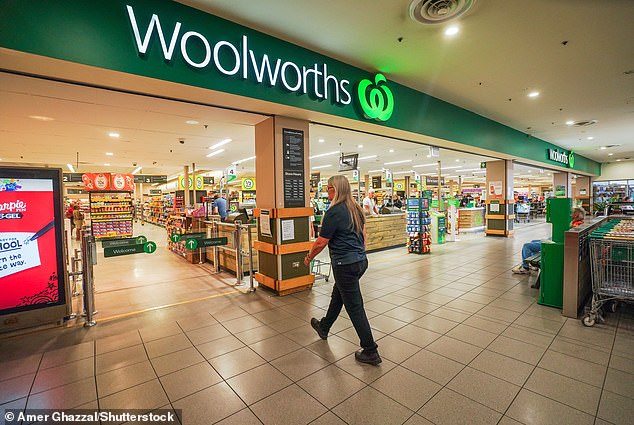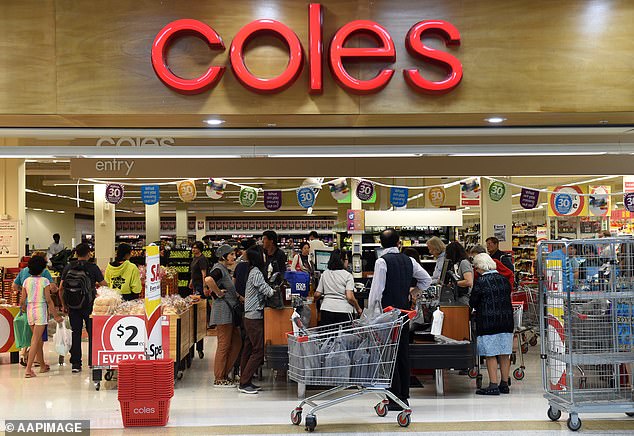Prime Minister Anthony Albanese has said he supports the idea of a new supermarket chain entering the market to boost competition in the country.
Coles and Woolworths were ordered to face a Senate inquiry examining whether customers were being subjected to “price gouging” during the cost of living crisis.
The Federal Senate investigation, created in December last year, examines the impact of market concentration on food prices and the pattern of pricing strategies employed by supermarket chains.
Albanese told ABC radio on Friday there were a small handful of supermarkets that “clearly” had “excessive market power”.

Prime Minister Anthony Albanese claimed Coles and Woolworths had “excessive market power” and flagged measures to encourage new supermarkets entering Australia to help prices and competition.
“We effectively have a duopoly in much of Australia,” he said.
‘In some places IGA or Aldi or other supermarkets will play a role, but in most cases there is a concentration of power so at the moment we have at least three ongoing investigations.
“We know that when farmers say they get less for their produce, that doesn’t necessarily translate into cheaper prices at the checkout.”
The Prime Minister ruled out a forced separation of Coles and Woolworths but flagged measures that would encourage new entrants to Australia.
He explained that the move could involve new entrants working with states to reduce the ability of other actors to “hoard land” and block or oppose new supermarkets.
“Well, we will certainly consider any recommendations that arise on how to encourage new entrants into the market,” he said.
‘That would obviously be helpful. More competition, the way the economy should work, should of course lead to lower prices, if people are competing.
‘In many places, of course, there is no duopoly, there is a monopoly in some smaller markets. However, the key is also this voluntary code of conduct in which there should be some mandate.”
Earlier on Friday, the NDIS and Government Services Minister Bill Shorten told Today presenter Karl Stefanovic that Labor was not going to break up Coles and Woolworths.
“We’re not going to break up Coles and Woolworths, but it was Labor who said enough was enough with the price rises,” Mr Shorten said.
“I think I was on your show six or seven times and I said Coles and Woolies need to be held to account.
‘I want them to offer better price competition. We’ll do whatever it takes… We just want to make sure Coles and Woolworths aren’t ripping people off.’


Woolworths (pictured) and Coles were ordered to face a Senate inquiry examining whether customers were being subjected to “price gouging” during the cost of living crisis. In its filing, Woolworths said it had taken steps to offer affordable grocery products.
Opposition finance spokeswoman Jane Hume added that Shorten “was right” but questioned why it took so long for the government to intervene.
‘It’s enough. But why did it take two years to get to this point, Bill? said Mrs. Hume.
‘[Albanese] I could have done it a year and a half ago because apparently the cost of living was the number one issue a year and a half ago. There is work that can be done with the competition for supermarkets, there is no doubt.
‘Why are supermarkets, for example, allowed to have land banks, preventing competitors from entering the market? I think it’s something that should be pursued.”
In its submission to the inquiry, Coles said it recognized the cost of living pressures facing Australian households.
“As one of Australia’s largest supermarkets, we take seriously our core role in providing essential products to Australians,” the statement reads.
“We are always looking for ways to deliver value to our customers and are committed to helping reduce the cost of living.”
The supermarket giant said that while prices may have increased in stores across the country, the increase did not translate into higher profits for the business, despite Coles reporting a net profit of $1 billion for the year. past financial.


Coles said in its submission to the inquiry that it recognized the cost of living pressures faced by households, but said that while its prices increased in stores, the increase did not translate into profits.
Woolworths said in its filing that the rise in grocery prices was driven by cost increases from partners, suppliers and “cyclical impacts on fresh food markets”.
“We are keenly aware of our responsibility to balance delivering value for our customers, paying our suppliers fairly for the goods they supply us, providing security and meaningful employment for our team and delivering adequate returns for our shareholders,” Woolworths said. .
“Australians are right to demand a food sector that delivers compelling consumer value every day and ensures a sustainable, innovative and competitive industry.”
Woolworths said it had taken steps to offer affordable grocery products through weekly special offers and stocking its own brand products at low prices.
The retailer added that it was confident prices would fall as global forces responsible for driving higher costs for the supply chain and raw materials moderate.
